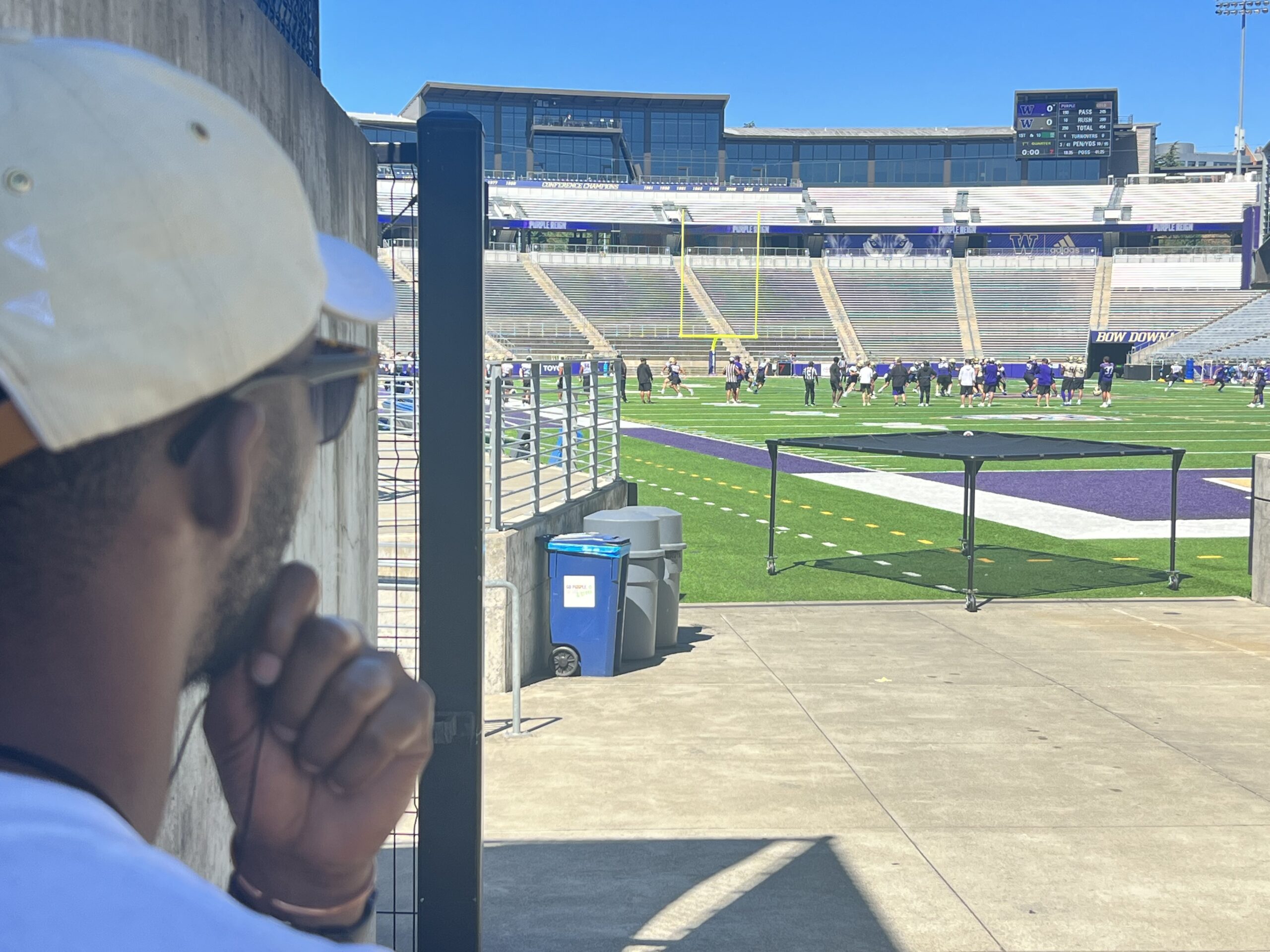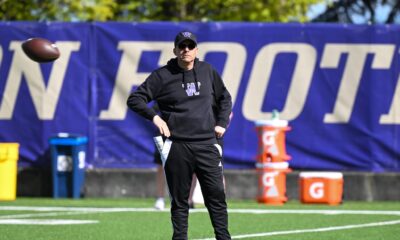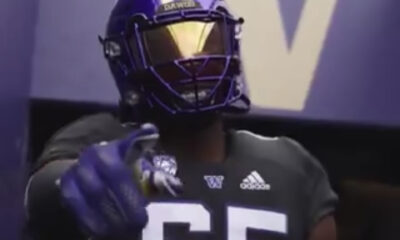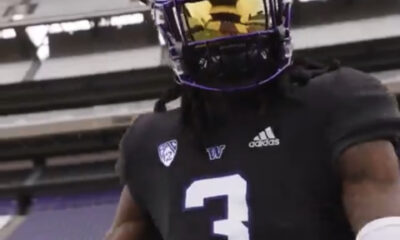This is part 2 of former Washington quarterback Luther Leonard’s journey from standout high school quarterback, to being convicted of armed robbery in 2013, to his life now as an aspiring musical artist. Part 1 looks at his life leading up to his conviction.
Today, Luther Leonard’s dining room table overlooks the south end of Lake Washington, with the tail end of Mercer Island visible off in the distance. The single pane window and the glistening water is a view that Leonard won’t take for granted.
A decade ago, for nearly two years he spent 23 hours a day behind a door with a small window at the Stafford Creek Corrections Center in Aberdeen, Washington. In those dark hours alone, he inventoried his own personal worth without his football identity–and he was humbled. There was very little natural light coming into his cell, so he had to become his own light.
How did a natural leader–one of the top high school quarterbacks in the country, a scholarship athlete at the University of Washington–have a gun in his hand, pointed at a Bank of America teller and demanding money, a year after graduation?
In order to understand how he got himself into the position where he could easily have been shot by police, he’d have to humble himself.
But before humility, he himself was humiliated.
“They put chains on your hands and your ankles. That’s humiliation. But you’re also angry and fearful because you don’t know where you’re going,” he recalled of his first day in prison at Stafford Creek. “You’re embarrassed because you’re naked with a bunch of other men in chains.”
Embarrassed and humiliated, Leonard was determined to not return.
“In prison, I listened to people’s stories from a genuine place of humility, ” he said of the many meetings with other inmates and counselors at the correctional facility. “When you’re on scholarship everything is great for those 4 years. The flights, the first-class hotels, the food–the University of Washington is first class.”
It’s not like that in the joint.
His meals were still chef-prepared, and he still had a uniform with a number on it; but where he slept was no dorm room. For his 700 or so days behind bars, he began preparing for the next 50 years of his life so that he was ready for life after prison. He would no longer be unprepared for life after football.
“It was like in football, you come up with a play from the playbook, it looks good on paper,” he said of reorienting his life. “But when you get the defense in front of you it doesn’t always go down like that. You gotta adjust and adapt and be nimble.”
Sitting there behind the door to his cell, he came to view said door as an opposing defense, and he had to find a way to beat it–to never have to play from behind again. First, he’d have to regain the self-confidence that was stripped away when he was moved to the receiver room.
“You can have the measurements, the 6-3, two hundred-whatever pounds, throw the ball 70 yards. If you don’t have confidence none of that matters because nobody is going to follow,” he said. “In order to be confident you have to know yourself.”
And when he found himself in prison he truly found himself and he was able to rediscover his self-worth. In complete darkness, he found light.
“There’s an element of God, an awakening within yourself that football can’t do for you,” he said. “I feel that if we as humans can keep a communion with the Most High, He will help direct your path.”
He also had to recapture his football mindset.
“In football, there’s the pregame setup where the first 10 plays are scripted. The same thing applied to my life where I had to come up with a 5-year plan. I couldn’t let anybody throw me off track,” he said.
His plan wasn’t going to start the day he stepped back out into freedom. He conditioned his mind in his cell to think like he was already in the real world.
“If you keep a goal in mind, the decisions along the way will become discipline-oriented,” he said.
He also knew that had to change his surroundings once he was out of the joint.
“I had to avoid the environment that wasn’t conducive to the person who I truly was,” he said. “Having a plan for myself, and sticking to it–executing it–much like a quarterback was how I was going to look at life.”
His house on the edge of Lake Washington is a blessing, but so were the 23 hours of solitude.
“The silence inside of prison, that you don’t have in life when you’re trying to pay this bill, trying to be here, be there, do this, do that, the constant barrage of media you can’t even hear yourself. The next thing you know you’re robbing banks,” he said.
There were never any signs of behavioral problems for Leonard when he was growing up. Okay, maybe one time he stole a candy bar, but he quickly realized that was not the path he wanted to go down, and he never stole again.
He didn’t have someone to look up to “who looked like him,” so when Washington hired Tyron Willingham, its first black head football coach, Leonard naturally gravitated toward him, signing with Washington in 2008.
“Society places low expectations on young black males,” Leonard said. “There are kids my age that didn’t have the opportunity that I had. That didn’t have the 3.5 GPA in high school, that wasn’t all-state, that didn’t have sports–that also didn’t have someone to look up to.”
What hurt Leonard the most about his sentence was that he’d live down to those low expectations.
When he graduated from UW in 2012, he was 21. Neither his mom nor dad had a home and he went back to stay with his aunt, who he’d lived with in high school. He became a part-time assistant basketball coach at Kirkland’s Juanita High School for the 2013 season. The sport wasn’t his forte, but leadership was so, he decided to help out.
“Communication, leadership, hard work–they’re skills that transfer to any job,” Leonard said.
When he was released from prison he had to find a way to not fall back into the same situation that his smarts and athleticism were supposed to get him out of in the first place–but also the same situation that put him behind bars. He thought that money would get him out of said situation.
“You see millionaires get divorced, billionaires commit suicide. Money can’t be the secret sauce,” he recalled of one of his awakenings in prison. “Your ‘self’ is the secret sauce. Once you understand that piece you won’t do stuff that’s out of character. Nobody can get you out of character–only you can choose to let yourself get out of character.”
Sometimes in his cell, with just a little bit of light coming in from the outside, he alone rediscovered his “self”–he rediscovered the Luther Leonard that the University of Washington recruited.
“I rediscovered the qualities that I have that transcend football: resilience, determination, humble pride, leadership, listening, guidance, toughness,” he recalled.
One of the toughest parts of his time inside was when his door was actually opened– and he still couldn’t go anywhere. Sort of like being in the locker room, knowing there’s a game going on outside, but you can’t watch or participate.
“You can’t go anywhere. There’s nobody coming to save you,” he said. “You’re just stuck.”
And when he was stuck, he had visitors who knew a different Leonard.
“I had support. People came to see me and spoke life into me,” he recalled. “They saw me at the bottom and still saw the real me. They let me know, ‘I got your back after this’. That helped me have some light.”
He had some help from above, but he also had some former Husky teammates reach out to him once he was out to see how they could help.
“Jermaine Kearse, Justin Glenn, D’Andre Goodwin all reached out to me when I was down and spent some time with me once I got out,” he said. “They kept my head in the right direction. They told me, ‘dude, I still see the shine in you’.”
Lenoard had someone in his life who understood his character–a former high school coach–and he took a commission-only job at a car dealership.
“You learn really fast how to sell or you don’t eat,” he laughed.
Another friend knew some of the struggles that the former Husky QB would face with an armed robbery conviction on his record.
“He told me, ‘you’re going to have difficulty finding housing with your criminal record’,” Leonard recalled. “I saw guys in jail that were going to be there 30, 40, 50 years from now–I told myself when I get out I’m going to let my freedom ring,” he said. “I might not be playing football but life is so much more bountiful.”
Leonard is thankful for the help with finding housing when he got out, and now for the opportunity that he has in the house that overlooks Lake Washington. Around his house, reminders of his Husky fandom can be found. A helmet, a football, and some other purple and gold items.
“It’s a blessing,” former Washington Husky quarterback said.
One that he won’t ever take for granted.











